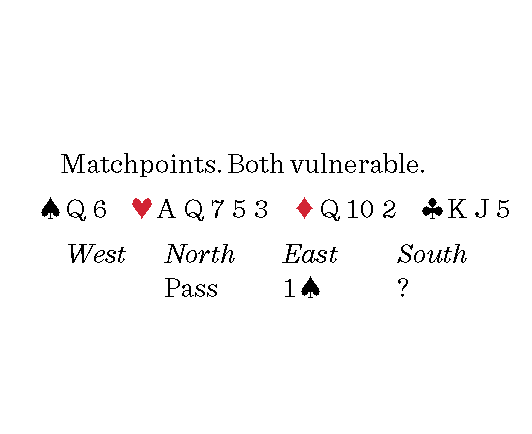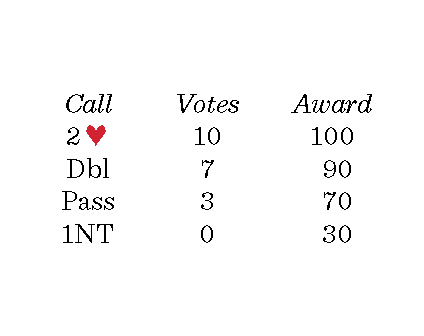
What’s your call?
| 1NT | ||||
| 2♣ | 2♦ | 2♥ | 2♠ | 2NT |
| 3♣ | 3♦ | 3♥ | 3♠ | 3NT |
| 4♣ | 4♦ | 4♥ | 4♠ | 4NT |
| 5♣ | 5♦ | 5♥ | 5♠ | 5NT |
| 6♣ | 6♦ | 6♥ | 6♠ | 6NT |
| 7♣ | 7♦ | 7♥ | 7♠ | 7NT |
| Dbl | Pass |
Opposite a passed partner, 10 panel-ists find a vulnerable 2♥ overcall with this hand and, predictably, blame it on matchpoints.
The Joyces: “We’d never dream of being at the two level at IMPs on such a poor suit and porous hand, but match-point scoring dictates playing in the major.”
“Oh so dangerous,” admits Boehm. “I would pass at IMPs, but matchpoints is a peculiar game, rewarding unsound actions.”
Stack bemoans, “What a pitiful suit for a vulnerable, two-level overcall. The excuse for this action is matchpoints and it is safer to enter now rather than later. It might actually be our hand.”
Cohen wants to trade in the ♠Q for the ♥10 in order to justify 2♥. “I dislike this in every possible way. The devil made me do it. The only rationalization I can give is that I dislike the other actions a tiny bit more.”
Colchamiro’s in the fray. “Not a very good hand, but who wouldn’t at matchpoints? At IMPs, I’d think long and hard about which way I was about to lose 13 IMPs.”
“These days you have to be really conservative to pass here,” comment the Gordons, “although we would do just that if our five-card suit was a minor.”
2♥ from the Sutherlins. “It is safer to compete now rather than later, and our most likely fit is in hearts, making 2° better than a double.”
“What are we missing?” ask the Coopers. “We don’t pass with 14 high-card points, or even with 12 if you don’t count the ♠Q.”
Even Kennedy doesn’t mind 2♥. “With matchpoint scoring, it’s a little safer to overcall with this poor suit. If it were IMPs, I would pass, and over LHO’s raise to 2♠, reopen with a double.”
Hampson finds an alternative. “Double. I prefer to have a stronger suit to overcall at the two level and I don’t want to pass.”
Weinstein also doubles. “If partner was an unpassed hand, we might have a game and I would be more likely to bid 2♥. Double gets all suits in play and makes it more likely that partner will be right when he competes. If I were to bid 2♥, partner could easily bid on to three when we’re going minus 200 undoubled.”
Meckstroth, too: “I don’t like a 2♥ overcall with five weak hearts.”
Robinson doubles. “I’ll try to find a fit without putting all my eggs in the heart basket. If partner wasn’t a passed hand, there would be more reason to overcall 2♥.”
Double by Walker. “This hand is closer to a 1NT overcall than a red 2♥ overcall.”
Meyers has this one in her notes. “I tend to double with 5–3–3–2 when the opponents open 1♠, especially when my partner is a passed hand and game doesn’t look likely.”
Rigal doubles. “All too often, match-points is about finding the best result possible, not the best possible result. With a hand like this, you want to enter the auction as safely as possible.”
Sanborn chooses the safety of a pass. “One of those darned-if-you-do/darned-if-you-don’t hands. The down-side of overcalling is pretty big, the upside less so. Double is a thought, but that doesn’t accomplish much either.”
Falk and Lawrence much more vehemently protest bidding anything at all with this sad little collection.
Here’s Falk: “Overcalling 2♥ on a ratty suit and ratty hand just invites a big minus when, by passing, we can an-ticipate a small minus or even a small plus on a good day. I can’t even imagine balancing with this pile of doodoo.”
“This is a pass,” insists Lawrence. “It is nothing like a 2♥ bid and it is even less like a double. Anyone who bids with the hand is playing with fire. It is a style that is conducive to winning at matchpoints. But it is not bridge. If I bid 2♥ and partner passes, I am officially terrified.”

